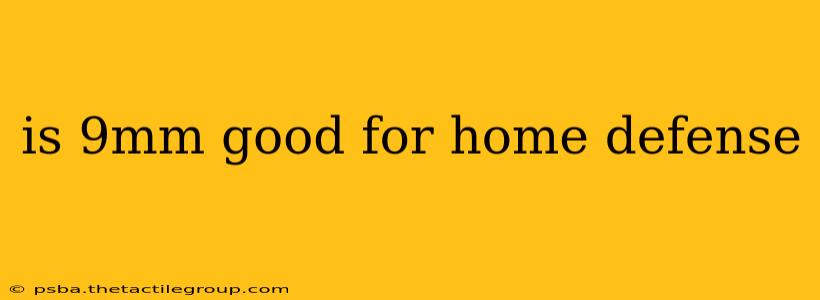Choosing the right firearm for home defense is a serious decision, demanding careful consideration of various factors. Caliber selection plays a crucial role, and the 9mm cartridge is frequently debated. This article delves into the strengths and weaknesses of the 9mm for home defense, helping you make an informed choice based on your specific needs and capabilities.
The 9mm: A Popular Choice for Self-Defense
The 9mm Parabellum (also known as 9x19mm) has become incredibly popular for self-defense, law enforcement, and military applications worldwide. Its widespread adoption stems from several key advantages:
- High Capacity: 9mm pistols often boast high magazine capacities, allowing for more shots before needing a reload – a crucial factor in a high-stress home invasion scenario.
- Manageability: The 9mm cartridge generally offers manageable recoil, even for smaller or less experienced shooters. This is vital for rapid follow-up shots under pressure.
- Availability and Affordability: Ammunition for the 9mm is readily available and relatively inexpensive compared to some other calibers, allowing for ample practice and training.
- Wide Range of Options: A vast array of 9mm handguns are available, ranging from compact carry pistols to full-size service weapons, ensuring a suitable option for various hand sizes and preferences.
9mm Ballistics: Penetration and Stopping Power
A common concern regarding the 9mm is its stopping power. While it's true that larger calibers generally deliver more energy, the 9mm's effectiveness depends on several factors beyond just bullet size:
- Bullet Design: Modern 9mm ammunition features a wide variety of bullet designs, including jacketed hollow points (JHPs) and jacketed soft points (JSPs), specifically engineered for optimal expansion and penetration in human tissue. These designs aim to maximize stopping power while minimizing overpenetration.
- Shot Placement: Accuracy is paramount. A well-placed shot with a 9mm will be far more effective than multiple poorly placed shots with a larger caliber. Training and practice are crucial for achieving accurate shot placement under stress.
- Penetration Depth: While overpenetration is a legitimate concern in a home environment, modern JHP ammunition is designed to balance penetration and expansion, reducing the risk of rounds passing through walls and potentially harming unintended individuals.
Alternative Calibers and Considerations
While the 9mm is a strong contender, other calibers deserve consideration:
- .45 ACP: Offers higher stopping power but with greater recoil and lower capacity.
- .40 S&W: A middle ground between the 9mm and .45 ACP, offering a balance of stopping power and manageability.
- 10mm: A powerful cartridge known for its stopping power, but with significant recoil.
Beyond Caliber: Factors to Consider for Home Defense
Choosing a firearm goes beyond just the caliber. Other important factors include:
- Training and Practice: Regular training is essential for safe and effective handling of any firearm, regardless of caliber. This includes dry firing practice, live fire drills, and scenario-based training.
- Reliability: Choose a firearm with a proven track record of reliability and minimal malfunctions.
- Ergonomics and Fit: The firearm should fit comfortably in your hand and be easy to operate under stress.
- Legal Considerations: Always comply with all applicable federal, state, and local laws regarding firearm ownership and use.
Conclusion: Is 9mm Right for You?
The 9mm is a highly effective caliber for home defense, offering a compelling combination of high capacity, manageable recoil, and readily available ammunition. However, the suitability of the 9mm ultimately depends on your individual circumstances, shooting skills, and comfort level. Thorough research, professional training, and careful consideration of all the factors discussed above are crucial in making an informed decision about the best firearm for your home defense needs. Remember, responsible gun ownership includes prioritizing safety and training above all else.

